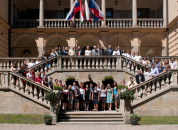
The Visegrad Summer School is a two-week educational programme which provides an interdisciplinary learning space for young Czech, Hungarian, Polish and Slovak students, and for their peers from other Central and Eastern European countries.
The programme consists of lectures, panel debates and seminars on issues and challenges relevant to the Visegrad Group region, the European Union and the CEE countries. The topics cover current social, economic, political and cultural issues, such as need of providing global institutions, Eastern Partnership, environmental protection, as well as regional and Euroatlantic cooperation. As former editions have shown the Visegrad Summer School is an unique forum to build relations of acceptance, friendship and cooperation between young people, who will soon shape the future of their countries and the continent.
aim
The Visegrad Summer School is an initiative organised by the Villa Decius Association since 2002. Our idea is to create an alternative platform to university for advanced studies on the Visegrad Group as well as other Central and East European countries. The programme is an opportunity for the participants to get acquainted with and discuss current social, security, economic, political and cultural issues. It is also an opportunity to learn about each other and start an international cooperation between the people and the countries.
programme
The programme of the ninth edition of the Visegrad Summer School includes debates on current political, cultural and social challenges in the global and European perspective, e.g. extremism, migration issues, Eastern Partnership, environmental protection, energy security policy, climate crisis and also regional and Euroatlantic cooperation. Global poverty, stabilizing missions at Afghanistan, Balkans and Africa will also be discussed. An important part of the democracy section are lectures on the integration role of countries and a presentation of the regional responsibility for global problems. Students apply the theoretical knowledge in practical activities during workshops – they develop, political, social and cultural projects that aim at establishing collaboration between them and their countries. On the weekend participants will be invited for study visits to borderlands of Malopolska region. Students will also attend artistic events and learn about the culture of Krakow.
target group
Students, graduates, PhD researchers, young professionals from the Czech Republic, Hungary, Poland, Slovakia, Ukraine and other CEE countries. We are looking for active, open-minded and creative people. The working language of the School is English, so good communication skills in English are essential.
participants
- Edita Bezdičková
- Livia Cseresová
- Jana Hrčková
- Katarína Klingová
- Pavol Kobárik
- Jana Kočová
- Katarína Lokšová
- Mária Nicolauová
- Michal Polgár
- Milan Zubíček
- Renata Pustowková
- Josef Fišer
- KateřinaHumplíková
- Michal Kuděla
- Karel Ulík
- Lucie Voženílková
- Adéla Denková
- Zbyněk Smetana
- Joanna Baczewska
- Dorota Chabiera
- Marek Garlicki
- Paweł Góralski
- Dariusz Kałan
- Karolina Koziura
- Martyna Pańczak
- Paulina Stepien
- Ewelina Tylec
- Zsuzsanna Végh
- András Szirkó
- Mihály Dán
- Viktória Bognár
- Márk Némedi
- Péter Lipcsei László
- Gábor Laczkó
- Mónika Magyar
- Júlia Magyari
- Anna Krykyn
- Kateryna Maltseva
- Oleksandr Marusyak
- Alex Perepolov
- Kateryna Sazonkina
- Dejan Marolov
- Katsia Klimenka
- Katerina Jankovska
- Mladen Karadzoski
- David Aleksander Grodzki
- Vladimir Balobaev
- Yuliya Baranova
- Toma Doru
- Matija Sturm




